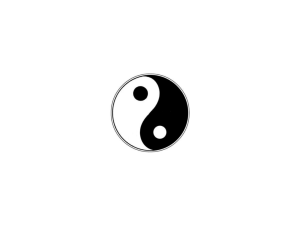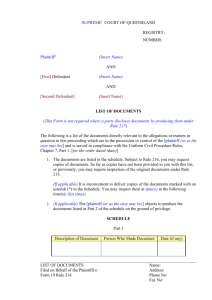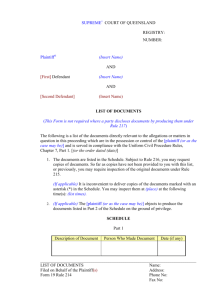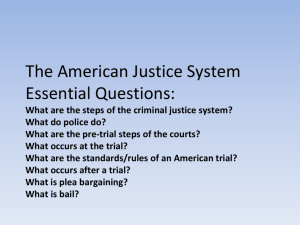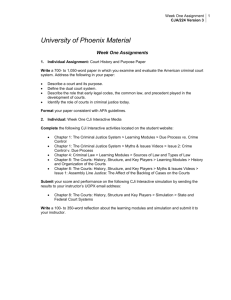English for lawyers I
advertisement
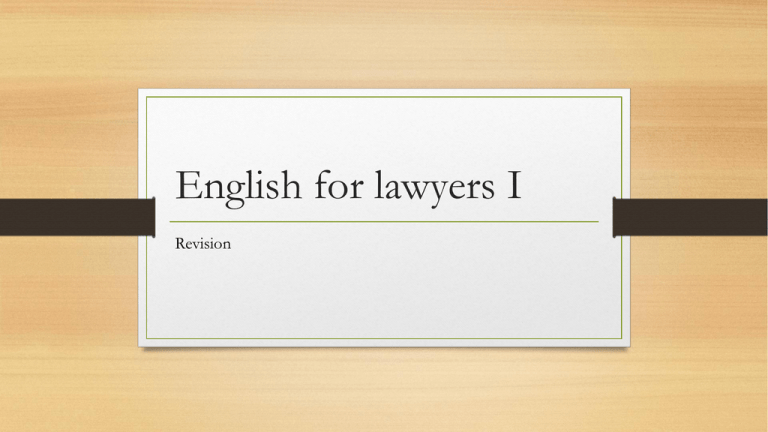
English for lawyers I Revision Put the verbs in brackets into the appropriate forms • Human beings _________ always ______________ (live), together under rules of one kind or another. It _____________________________ (matter, negative) where in the world; it does not matter in what age, whether the society in which they lived was simple or a complex one by our present-day standards – humans __________ always ______________ by rules (live). These rules ____________________(influence, passive) by nature and by society in which people live. They may ______________________( influence, passive) by religious or secular beliefs, and they will cater for the ideas of right and wrong that ____________________(develop, passive) over time to suit the society in which they live. Key • Human beings have always lived together under rules of one kind or another. It does not matter where in the world; it does not matter in what age, whether the society in which they lived was simple or a complex one by our present-day standards – humans have always lived by rules. These rules are influenced by nature and by the society in which people live. They may be influenced by religious or secular beliefs, and they will cater for the ideas of right and wrong that have been developed over time to suit the society in which they live. Put the verbs in brackets into the appropriate forms • Since the law ______________(cover) (2) a wide variety of matters it can be helpful to divide it into different categories. The first distinction is that between international and national (municipal) law; national law can then ____________________(classify, passive) (3) into public and private law; finally these classifications can ________________________(sub-divide, passive)(3) into a number of different categories. International law ________________(deal) (2) with disputes between nations; much of this law ______________________(come) (2) from treaties which __________________(agree, passive) (3) by the governments of the countries. Key • Since the law covers a wide variety of matters it can be helpful to divide it into different categories. The first distinction is that between international and national (municipal) law; national law can then be classified into public and private law; finally these classifications can be sub-divided into a number of different categories. International law deals with disputes between nations; much of this law comes from treaties which have been agreed by the governments of the countries Put the verbs in brackets into the appropriate forms • National law is the law which __________________(apply) (2) within a country: each country ______________(have) (2) its own national law and there are often wide differences between the law of individual countries. This can _______________________(show, passive) (3) by the fact that Scotland ________________(have) (2) its own law and legal system which are quite separate from the law and legal system which operate in England and Wales. Within national law there is usually a clear distinction between public ad private law. Public law ___________________(involve) (2) the State or government in some way, while private law is concerned with disputes between private individuals or businesses. Both public and private law can ____________________(sub-divide, passive) (3) into different categories. Key • National law is the law which applies within a country: each country has its own national law and there are often wide differences between the law of individual countries. This can be shown by the fact that Scotland has its own law and legal system which are quite separate from the law and legal system which operate in England and Wales. Within national law there is usually a clear distinction between public ad private law. Public law involves the State or government in some way, while private law is concerned with disputes between private individuals or businesses. Both public and private law can be sub-divided into different categories.(14) Fill in the missing words: Administrative, commits, Constitutional, Criminal, defendant, election, offence, Parliament, prosecute, punishment • ___________________law controls the method of government and any disputes which arise over such matters as who is entitled to vote in an ______________, or who is allowed to become a Member of ______________________, or whether an election was carried out by the correct procedure. ________________law controls how Ministers of State or other public bodies such as local councils should operate. ______________________law sets out the types of behaviour which are forbidden at risk of ___________________. A person who _________________a crime is said to have offended against the State, and so the State has the right to _______________________them. At the end of the case, if the ___________________ is found guilty, the court will punish the defendant for the________________, because he or she has broken the criminal law set down by the State. Key • Constitutional law controls the method of government and any disputes which arise over such matters as who is entitled to vote in an election, or who is allowed to become a Member of Parliament, or whether an election was carried out by the correct procedure. Administrative law controls how Ministers of State or other public bodies such as local councils should operate. Criminal law sets out the types of behaviour which are forbidden at risk of punishment. A person who commits a crime is said to have offended against the State, and so the State has the right to prosecute them. At the end of the case, if the defendant is found guilty, the court will punish the defendant for the offence, because he or she has broken the criminal law set down by the State. Fill in the missing words: civil, courts, crime, private (2x), public (2x), state • It is important to realise that ______________law is very different from criminal law. Criminal law is part of ______________law while civil law is the separate category of ________________ law. The reason that criminal law is part of _______________ law is that _______________ is regarded as an act against the ________________and society as a whole. Civil law is called _______________ law because the issues it deals with are between two individuals. The two types of law have different aims and are dealt with in different __________________. Key • It is important to realise that civil law is very different from criminal law. Criminal law is part of public law while civil law is the separate category of private law. The reason that criminal law is part of public law is that crime is regarded as an action against the state and society as a whole. Civil law is called private law because the issues it deals with are between two individuals. The two types of law have different aims and are dealt with in different courts. Fill in the missing words: Act, crime, customs, judicial, statute, statutory, theft, unwritten • Common law is the basis of English law: it is ________________ law that developed from _____________ and judicial decisions. The phrase 'common law' is still used to distinguish laws that have been developed by _______________ decisions, from laws that have been created by ____________or other legislation. For example, murder is a common law ____________ while theft is a ___________________ crime. This means that murder has never been defined in any __________ of Parliament, but ______________ is now defined by the Theft Act 1968. Key • Common law is the basis of English law: it is unwritten law that developed from customs and judicial decisions. The phrase 'common law' is still used to distinguish laws that have been developed by judicial decisions, from laws that have been created by statute or other legislation. For example, murder is a common law crime while theft is a statutory crime. This means that murder has never been defined in any Act of Parliament, but theft is now defined by the Theft Act 1968. • Common law also has another meaning, in that it _____________________ (use, passive) (3) to distinguish between rules that _______________________ (develop, passive) (3) by the common law courts (the King's courts) and the rules of Equity which were developed by the Lord Chancellor and the Chancery courts. Equity _____________________(develop)(2) because of problems in the common law. Only certain types of case ___________________(recognize, passive) (3). The law _________(be) was also very technical; if there was an error in the formalities the person ___________________(make) (2) the claim would lose the case. Key • Common law also has another meaning, in that it is used to distinguish between rules that were developed by the common law courts (the King's courts) and the rules of Equity which were developed by the Lord Chancellor and the Chancery courts. Equity developed because of problems in the common law. Only certain types of case were recognized. The law was also very technical; if there was an error in the formalities the person making the claim would lose the case. Fill in the missing words: common, compensation, damages, defendant, parties, plaintiff, remedy • Another major problem was the fact that the only ___________ the _____________ law courts coud give was ____________________ – that is an order that the _________________ pay a sum of money to the ___________________ (now claimant) by way of compensation. In some cases this would not be the best method of putting matters right between the ______________. For example, in a case of trespass to land, where perhaps the defendant had built on his neighbour's land, the building would still be there and the plaintiff would have lost the use of that part of his land. In such a situation the plaintiff would probably prefer to have the building removed, rather than be given money in _____________ Key • Another major problem was the fact that the only remedy the common law courts coud give was 'damages' – that is an order that the defendant pay a sum of money to the plaintiff (now claimant) by way of compensation. In some cases this would not be the best method of putting matters right between the parties. For example, in a case of trespass to land, where perhaps the defendant had built on his neighbour's land, the building would still be there and the plaintiff would have lost the use of that part of his land. In such a situation the plaintiff would probably prefer to have the building removed, rather than be given money in compensation. • People who could not obtain justice in the common law courts _______________(appeal) directly to the king. Most of these cases _____________________(refer, passive) to the king's Chancellor, who ______________(be) both a lawyer and a priest, and who ____________________(become) known as the keeper of the king's conscience. This was because the Chancellor __________________(base) his decisions on principles of natural justice and fairness, making a decision on what seemed 'right' in the particular case rather than on the strict following of previous precedents. He was also prepared to look beyond legal documents, which ___________________(consider, passive) legally binding by the common law courts, and to take account of what the parties had intended to do Key • People who could not obtain justice in the common law courts appealed directly to the king. Most of these cases were referred to the king's Chancellor, who was both a lawyer and a priest, and who became known as the keeper of the king's conscience. This was because the Chancellor based his decisions on principles of natural justice and fairness, making a decision on what seemed 'right' in the particular case rather than on the strict following of previous precedents. He was also prepared to look beyond legal documents, which were considered legally binding by the common law courts, and to take account of what the parties had intended to do.

